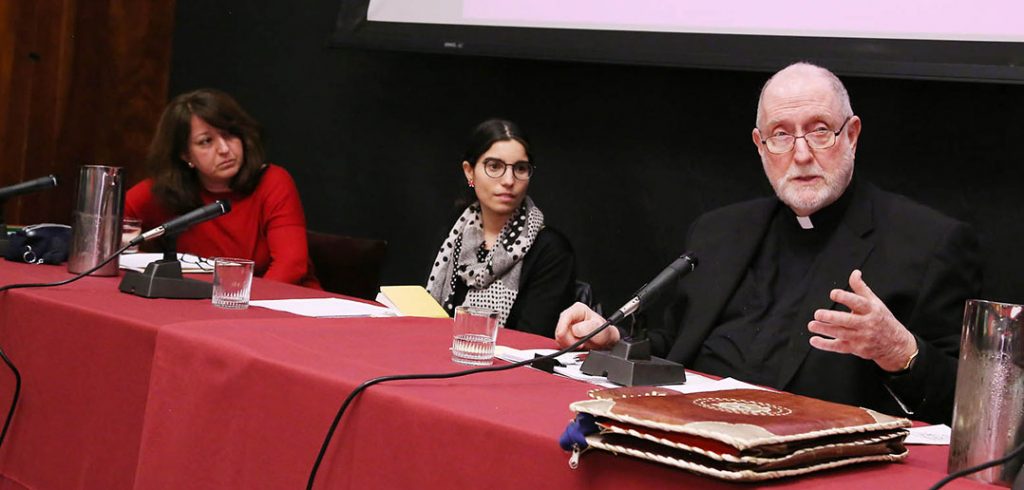We take for granted today that judges uphold the rule of law in the service of justice.
But this concept of authority and impartiality, according to Patrick J. Ryan, S.J., evolved a great deal over the years. In “Judging Justly: Judgment in Jewish, Christian, and Muslim Traditions,” Father Ryan, Fordham’s Laurence J. McGinley Professor of Religion and Society, explored how Jewish, Christian, and Muslim faiths contributed to that idea through their own unique traditions.
He framed his discussion of judgment with the tragic story of how three High Court judges in Ghana were murdered in 1982 precisely because they had given judicial redress to people convicted by a kangaroo court under a military regime.
In remarks delivered on March 28 and March 29 as part of the annual Spring McGinley Lecture,
Father Ryan delved into examples from scripture that illustrated how the faithful have struggled with concepts such as mercy and justice. In the Book of Genesis, he noted that God, whom Jews regard as the supreme judge, had a “crowded docket”: Weighing in on the fratricide of Cain, and condemning the corrupt and violent contemporaries of Noah yet sparing the ark-builder and his family.
In Christian scripture, he recalled an account in the Gospel of John, where Jesus is confronted by “the scribes and the Pharisees” asking him to judge a woman caught in the act of adultery. Jesus play-acted the role of judge, writing on the ground, and finally declaring, Jesus’ declaration “Let anyone among you who is without sin be the first to throw a stone at her.” illustrates the importance of impartiality and fairness.
“When Jesus finally rises from his play-acting, he finds that all the guilty accusers of the woman have departed, ‘one by one, beginning with the elders,’” Father Ryan said.
“One possible reason that the placement of this Gospel passage in the New Testament has proven so problematic may be that the discipline of the early church, in cases of adultery, was much less merciful than that of Jesus.” *
In Islam, as in Christianity and Judaism, God is also the ultimate judge, he said. His command and judgment are closely associated with the commands and judgments issued by the Messenger, the Prophet Muhammad. That practice continued after Muhammad’s death via judges who were concretized as the caliphs’ appointees in the Sunni tradition from the seventh to at least the 13th century, and the appointees of the imams in the Shi‘i tradition.
A qadi, or judge in the Sunni Muslim tradition, was appointed by the caliphs in the seventh century, and gradually began to exercise judicial functions in the eighth century, said Father Ryan. When the Turkish government suppressed the caliphate in 1924, however, a central religious-political institution was lost. Since then, Muslim judges are often appointed by national or regional governments. This has led to some controversial rulings in Nigeria, in particular, he noted, involving the amputation of hands for sheep-stealing, as well as overly zealous accusations of adultery against women based on circumstantial evidence only.
“Better trained Muslim judges, with expertise in comparative law and a broader vision of Islamic jurisprudence, can be found in many of the Gulf States,” he said. “But there have been highly problematic judgments handed down by judges, not only in northern Nigeria but also in Saudi Arabia and Egypt in recent decades.”
Respondents to Father Ryan’s lecture included Sarit Kattan Gribetz, Ph.D., assistant professor of theology at Fordham, and Ebru Turan, Ph.D., assistant professor of history at Fordham. Gribetz highlighted two passages from Genesis Rabbah and the Babylonian Talmud and one from the Torah that illustrate the ongoing debate between mercy and justice in God’s mind. God is compared to a king who holds up two empty cups and notes that they will crack when filled with cold water and burst when filled with hot water. The temperatures are stand-ins for too much mercy and too much justice.
“[They] represent radical extremes-order and chaos, suffocating restriction and unbounded freedom. Each on their own is assumed to be too dangerous—so dangerous that it will shatter, crack or deform the world,” she said.
Turan further developed Father Ryan’s history of how the role of judge developed historically in the Muslim tradition. The Ottoman Empire, from the 13th to the early 20th century, developed a system of training legal scholars for such posts. With the break-up of the Ottoman Empire after 1918, modern Turkey appoints judges with a much more secular orientation.
Father Ryan said offered three conclusions from the faith traditions’ experiences with justice:
-Judges need protection from manipulative politicians, established ruling classes, and populist demagogues. He cited as examples the Roman-dominated Hebrew sanhedrins, Pope Urban II commanding Christian knights to go on Crusade, and modern “Muslim muftis” who “declare every military adventure of a Middle Eastern dictator a jihad.”
-Judges should have excellent legal credentials, a deep understanding of the law in their own tradition, and a sense of comparative law. There is no room in the courtroom for mediocre judges.
-Judges benefit from differences in legal opinion, or “ikhtilaf,” an Islamic concept being promoted by movements concerned with the status of Muslim women. This contrasts with the generally approved idea of Islamic legal consensus, or “ijma,” relied on by Orthodox Jews, Catholic Christians, and the various Eastern Christian Churches.

